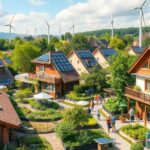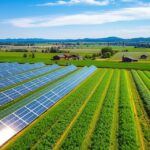Solar panel prices have plummeted 89% since 2010. This dramatic drop makes affordable solar panels more accessible for small-scale projects. Homeowners and communities now have new opportunities to embrace clean energy solutions.
Low-cost solar panels are changing how Americans use energy. These budget-friendly options offer a cheaper way to generate sustainable power. They help individuals and small communities cut electricity costs and reduce environmental impact.
Our guide explores the top 10 low-cost solar panels for small-scale projects. We’ll examine performance metrics, cost-effectiveness, and practical considerations. This information makes solar energy more attainable than ever before.
These affordable solar panels are smart investments for both economic and environmental reasons. They work well for residential rooftops and community installations. Our guide offers detailed insights for selecting the best solar solutions for your needs.
Are you a homeowner looking to lower electricity bills? Or a community leader interested in sustainable infrastructure? This guide provides essential information about budget-friendly solar technologies. You’ll learn how to navigate the world of affordable solar options.
Introduction to Low-Cost Solar Panels
Solar energy has changed how homeowners approach renewable power solutions. Budget solar options make sustainable technology accessible to more people. These solutions are transforming the renewable energy landscape.
Solar panels have evolved, offering affordable renewable energy for homes and small projects. These innovative technologies provide cost-effective alternatives to traditional electricity sources.

What Are Low-Cost Solar Panels?
Low-cost solar panels generate electricity at a reduced price point. They feature lower manufacturing costs and simplified design.
These panels offer high-efficiency performance in a compact size. They’re ideal for small-scale installations.
- Lower manufacturing costs
- Simplified design and materials
- High-efficiency performance
- Compact size for small-scale installations
“Affordable solar technology is democratizing renewable energy access for everyday consumers.” – Clean Energy Research Institute
Benefits of Choosing Affordable Solar Panels
Budget solar solutions offer multiple advantages. They reduce upfront costs and provide faster returns on investment.
These panels also help decrease your carbon footprint. By choosing affordable renewable energy, you save money and support sustainable living.
- Reduced Initial Investment: Lower upfront costs make solar energy more attainable
- Faster Return on Investment: Quicker payback periods for energy savings
- Environmental Impact: Decreased carbon footprint through renewable energy adoption
Key Factors to Consider When Choosing Solar Panels
Choosing solar panels for homes requires careful thought. Smart installations balance performance, durability, and value. These factors help create cost-effective solar projects.
Homeowners must consider various aspects for the best results. The process involves more than just comparing prices. Understanding solar panel technology is crucial.
Efficiency Ratings: Understanding Performance
Solar panel efficiency shows how much sunlight becomes electricity. Higher efficiency panels offer several benefits. They produce more power in smaller spaces.
- Generate more power in smaller spaces
- Provide better energy output per square foot
- Maximize electricity production for residential solar installations
“Not all solar panels are created equal. Efficiency matters more than you might think.” – Solar Energy Expert
Durability and Warranty Options
Durability is key for cost-effective solar installations. Homeowners should review warranty terms carefully. This protects their investment over time.
| Warranty Aspect | Typical Coverage | Importance |
|---|---|---|
| Product Warranty | 10-25 years | Covers manufacturing defects |
| Performance Warranty | 25-30 years | Guarantees minimum power output |
| Degradation Rate | 0.5-0.8% annually | Indicates panel longevity |
Investing time in understanding these key factors can lead to more effective and efficient residential solar solutions.
Top 10 Low-Cost Solar Panels for Small-Scale Projects
Affordable solar panels for small-scale projects are now widely available. Many options exist for homeowners and small businesses. Our list showcases top-performing, budget-friendly solar panel models.
Performance and affordability are crucial when choosing low-cost solar panels. These models represent the best affordable options currently available.
1. Canadian Solar CS6K Series
The Canadian Solar CS6K offers high efficiency at a reasonable price. It boasts a 17.5% module efficiency. The panel features a sturdy aluminum frame for longevity.
Its competitive pricing makes it ideal for small-scale installations.
- High module efficiency of 17.5%
- Robust aluminum frame for durability
- Competitive pricing for small-scale installations
2. Trina Solar TSM-330 DD06M
Trina Solar balances performance and cost effectively. It delivers a 330-watt power output. The panel excels in temperature coefficient and low-light conditions.
- 330-watt power output
- Excellent temperature coefficient
- Enhanced low-light performance
3. JinkoSolar JKM310M-60
JinkoSolar offers reliable and affordable panels. They achieve a high module efficiency of 18.7%. These panels are competitively priced and durable in various settings.
- High module efficiency of 18.7%
- Competitive pricing
- Proven durability in various environments
4. REC Solar REC320TP2
REC Solar combines innovation with affordability. Their panels have a 320-watt power rating. They use twin peak technology and offer excellent warranty coverage.
- 320-watt power rating
- Twin peak technology
- Excellent warranty coverage
“Investing in low-cost solar panels doesn’t mean compromising on quality. These models prove that affordable solar technology can deliver exceptional performance.” – Solar Energy Expert
These low-cost solar panels are perfect for small-scale projects. They blend performance, reliability, and affordability seamlessly.
Comparative Analysis of Affordable Solar Panels
Budget solar solutions require a smart approach to understand panel performance and cost-effectiveness. Solar tech has evolved, offering homeowners more accessible options for cost-effective installations.
Recent advances have made solar power more affordable and efficient. This opens up new possibilities for homeowners seeking clean energy solutions.
When comparing affordable solar panels, several key factors come into play. These include efficiency ratings, power output, durability, and long-term value.
- Efficiency ratings
- Power output
- Durability
- Long-term value
Performance Metrics: Breaking Down the Numbers
Evaluating solar panel performance goes beyond initial price. Homeowners should consider watts per square foot and energy conversion capabilities.
Budget solar solutions typically range between 15-22% efficiency. Top-tier affordable panels push toward the higher end of this spectrum.
“Not all solar panels are created equal. Performance matters more than price alone.” – Solar Energy Industry Expert
Cost-Effectiveness Analysis
Cost-effective solar installations balance upfront expenses with long-term energy savings. Cheaper panels aren’t always the most economical choice in the long run.
Energy production and durability are crucial factors to consider. These aspects can greatly impact the overall value of your solar investment.
| Panel Type | Average Efficiency | Cost per Watt | Estimated Annual Savings |
|---|---|---|---|
| Monocrystalline | 20-22% | $2.50-$3.00 | $600-$800 |
| Polycrystalline | 15-17% | $2.00-$2.50 | $400-$600 |
Smart consumers know that investing in pricier panels can bring big benefits. These include better energy generation and lower maintenance costs over time.
Installation Tips for Small-Scale Solar Projects
DIY solar kits need careful planning and smart execution. Small-scale solar projects require precision to maximize energy output. Thoughtful prep is key for system efficiency.
Successful solar panel setup involves many crucial factors. These can greatly affect your project’s performance and lifespan.
Selecting the Right Location
Choosing the best spot is vital for DIY solar kits. Consider these key factors:
- Direct sunlight exposure
- Minimal shade interference
- Structural integrity of mounting surface
- Angle and orientation toward sun’s path
Working with Professional Installers
Small-scale solar projects can be fun DIY tasks. Yet, professional help offers big benefits:
- Comprehensive site assessment
- Precise system design
- Electrical safety compliance
- Warranty protection
“The difference between a good and great solar installation often lies in professional attention to detail.” – Solar Energy Industry Expert
| Installation Aspect | DIY Approach | Professional Installation |
|---|---|---|
| Cost | Lower upfront expense | Higher initial investment |
| Technical Complexity | Moderate skill required | Advanced technical expertise |
| Long-term Reliability | Potential performance issues | Guaranteed system optimization |
Careful planning transforms small-scale solar projects from challenging tasks to rewarding renewable energy investments.
Incentives and Rebates for Solar Panels
Solar panels can significantly cut your energy costs. The U.S. offers various financial incentives for homeowners. These make solar adoption more accessible and appealing.
Federal Tax Credit Opportunities
The government supports solar projects through tax credits. The Investment Tax Credit (ITC) allows deductions from federal tax liability. This applies to a percentage of solar installation costs.
- Currently offers 30% tax credit for systems installed between 2022-2032
- Applies to both residential and commercial solar panel installations
- No maximum credit limit for residential solar systems
“Solar incentives make renewable energy more affordable than ever before.” – Clean Energy Policy Expert
Local and State Incentives
Many states and local governments offer additional financial support. These incentives can greatly reduce initial installation costs. They can also speed up your return on investment.
- State-level tax credits
- Property tax exemptions
- Solar renewable energy certificates
- Local utility rebate programs
Homeowners should research specific incentives in their region to maximize potential savings on affordable renewable energy projects.
Maintenance of Low-Cost Solar Panels
Regular care is vital for low-cost solar panels in small-scale projects. It helps homeowners protect their investment and ensures optimal energy production. Proper maintenance maximizes performance and longevity of these panels.
Routine Inspections and Cleaning
A systematic approach keeps low-cost solar panels clean and well-maintained. Dust, debris, and environmental factors can greatly impact solar panel efficiency.
- Conduct visual inspections every 3-4 months
- Clean panels with soft cloth and water
- Remove leaves, bird droppings, and other debris
- Check for any signs of physical damage
“Regular maintenance can improve solar panel efficiency by up to 20%.” – Solar Energy Experts Association
Signs of Damage to Watch For
Early problem detection prevents major issues in small-scale solar projects. Homeowners should know specific warning signs of panel degradation.
| Damage Type | Potential Causes | Recommended Action |
|---|---|---|
| Microcracks | Temperature variations | Professional assessment |
| Discoloration | UV exposure | Panel replacement consideration |
| Reduced Output | Dirt accumulation | Thorough cleaning |
A consistent maintenance routine ensures optimal performance of low-cost solar panels. It also helps extend the overall lifespan of the system.
Environmental Impact of Solar Energy
Solar energy offers a powerful solution to combat climate change. It reduces environmental damage and makes clean power more accessible to communities.
This renewable energy source brings remarkable benefits beyond individual homes. Community solar projects are speeding up this green transformation.

Reduction of Carbon Footprint
Solar panels help minimize carbon emissions significantly. They generate electricity without burning fossil fuels, providing clean energy.
This clean energy contributes to less greenhouse gas production. It also lowers air pollution and reduces dependence on non-renewable sources.
- Decreased greenhouse gas production
- Lower atmospheric pollution levels
- Reduced reliance on non-renewable energy sources
“Every kilowatt of solar energy generated is a step towards a more sustainable future.” – Clean Energy Research Institute
Contribution to Renewable Energy Adoption
Affordable renewable energy is changing how communities generate power. Small-scale solar projects show that sustainable tech can be eco-friendly and cost-effective.
- Increased renewable energy infrastructure
- Local economic development
- Enhanced energy independence
By embracing solar technology, individuals and communities can directly contribute to global environmental conservation efforts.
Conclusion: Choosing the Right Solar Solution
Affordable solar panels offer great chances for eco-friendly homes. Off-grid systems can cut power bills and help the planet. Start by figuring out your energy needs and finding the right tech.
Evaluating Long-Term Benefits
Solar panels save money over time. They lower power bills and may boost your home’s value. New tech makes off-grid systems better for homes and small projects.
Encouragement to Embrace Solar Energy
Green energy is the future, with solar power leading the way. Cheap panels help you shrink your carbon footprint and gain energy freedom. Picking the right solar setup helps build a cleaner world.
Start your solar journey with good research. Know your energy needs and budget. Find panels that fit both.
The solar shift is happening now. Join this exciting energy change and make a difference today.
FAQ
What are low-cost solar panels?
Low-cost solar panels are budget-friendly photovoltaic modules for small-scale projects. They offer a balance between price and performance. These panels make solar energy more accessible to homeowners and small businesses.
How much do affordable solar panels typically cost?
Affordable solar panels cost between $200 and $500 each. Total system costs for small projects usually range from $5,000 to $15,000. Prices vary based on panel efficiency, brand, wattage, and installation complexity.
Federal tax credits and local incentives can lower overall costs significantly.
Are low-cost solar panels as effective as more expensive options?
Budget solar panels may have slightly lower efficiency ratings than premium models. However, many affordable options still provide excellent performance. Modern low-cost panels can achieve efficiency rates between 15-20%.
Reputable manufacturers like Canadian Solar and Trina Solar offer viable options for residential projects.
What factors should I consider when choosing affordable solar panels?
Key considerations include panel efficiency, warranty length, durability, and manufacturer reputation. Also consider temperature coefficient and overall system cost.
Look for panels with 15-20% efficiency ratings and 10-25 year warranties. Choose established manufacturers with proven track records. Ensure compatibility with your specific energy needs.
Can I install low-cost solar panels myself?
DIY solar kits are available, but professional installation is recommended for most homeowners. Professional installers ensure proper panel positioning and correct electrical connections.
They also ensure compliance with local building codes and optimal system performance. Professional installation helps preserve manufacturer warranties.
What government incentives are available for solar panel installations?
Federal and state incentives can significantly reduce solar installation costs. The Federal Solar Investment Tax Credit covers 30% of system costs.
Other incentives include state-specific rebate programs and net metering credits. Property tax exemptions and local renewable energy grants may also be available.
How long do low-cost solar panels typically last?
Most affordable solar panels have a lifespan of 25-30 years. Their performance gradually declines over time. Manufacturers typically offer a 10-year product warranty.
They also provide a 25-year performance warranty. Panels usually maintain 80-85% efficiency after 25 years.
Are solar panels effective in areas with less sunlight?
Solar panels can generate electricity even in areas with moderate sunlight. Technological advancements have improved panel performance in diverse climates.
Panel angle, positioning, and local solar irradiance affect overall energy production.
What maintenance do solar panels require?
Low-cost solar panels need minimal maintenance. An annual professional inspection is recommended. Periodically clean the panels to remove dust and debris.
Check for physical damage and monitor system performance. Ensure there’s no shade obstruction.
How do solar panels contribute to environmental sustainability?
Solar panels reduce carbon emissions by generating clean, renewable energy. They decrease reliance on fossil fuels and lower greenhouse gas emissions.
Solar energy provides a sustainable alternative to traditional power sources. It supports local and global environmental conservation efforts.






